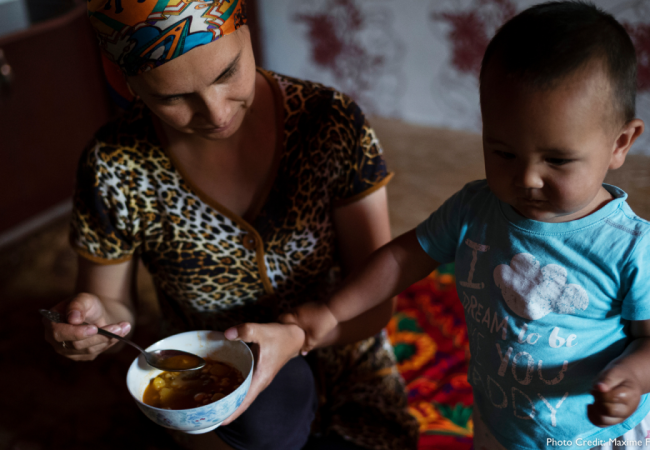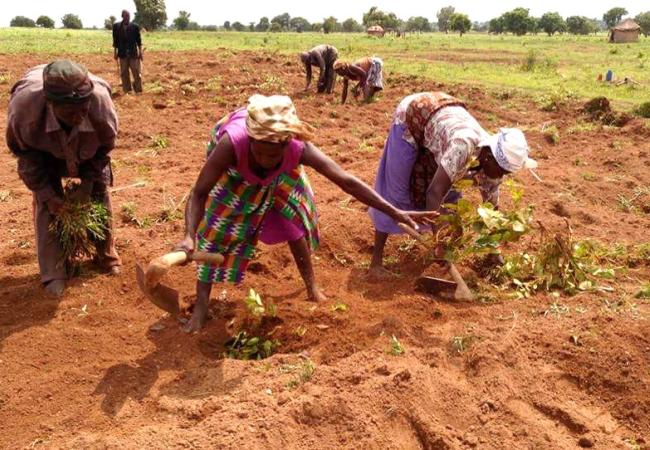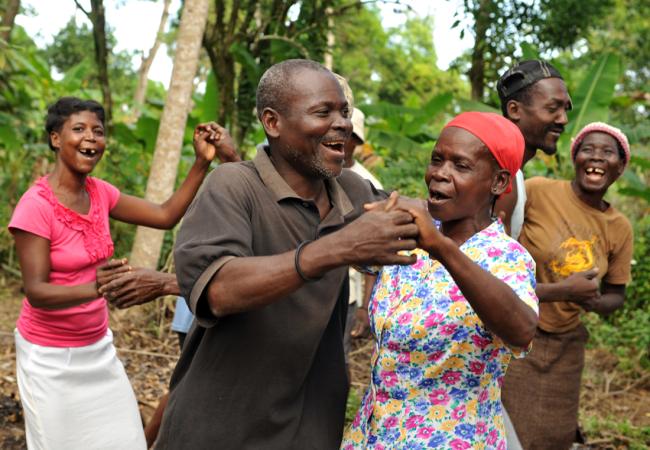
Women and children are especially vulnerable to poor nutrition outcomes in both emergency and non-emergency settings. USAID Advancing Nutrition developed tools and resources to strengthen program design and implementation on infant and young child feeding in non-emergency contexts by integrating nurturing care and early learning and using local foods to optimize diets. We also developed resources and guidance on engaging men in maternal, infant, and young child nutrition, strengthening the sustainability of care group volunteers, and improving the quality of social and behavior change programming to improve nutrition.
In emergency settings, USAID Advancing Nutrition focused on strengthening nutrition programming on complementary feeding in emergencies and understanding the association between nutrition-sensitive agriculture interventions on women and children’s diets in complex emergencies.
Infant and Young Child Feeding and Early Childhood Development
Global research shows that integrated approaches—such as combining nutrition and responsive care and early learning (RCEL) interventions that provide more holistic care—result in better outcomes for children. We now have a more practical understanding of how to combine nutrition and responsive care during the critical first 1,000 days, from pregnancy to a child’s second birthday. The World Health Organization recommends integrating nutrition programming with RCEL activities and the U.S. Government’s Global Child Thrive Act mandates the integration of evidence-based early childhood development activities into relevant strategies and programs, including nutrition.
However, practical guidance and tools to support effective, integrated programming is needed. To address this need, USAID Advancing Nutrition developed the Supporting Integrated Infant and Young Child Nutrition and Early Childhood Development Programming: Ages and Stages Reference Package and Resource Collection. This package builds upon USAID Advancing Nutrition’s Responsive Care and Early Learning (RCEL) Addendum and UNICEF’s Community Infant and Young Child Feeding Counseling to integrate programming for nutrition and care that specifically addresses a child’s age and developmental stage, particularly from birth to age two, when a child’s brain is growing most rapidly.
Optimizing Diets by Using Local Foods for Improved Nutrition for Women and Children
Most nutrition programs center on improving nutrition outcomes among women and children and specifically their dietary diversity. However, improving complementary feeding through dietary diversity is often quite challenging. Identifying which locally available nutrient-dense foods to offer children in what quantities and frequencies is not always clear, and households can also face challenges in access, affordability, and availability of complementary foods. USAID Advancing Nutrition aimed to provide two pathways that USAID resilience food security activity (RFSA) implementing partners can consider in their response. Depending on the program context, the pathways use a household food-based approach for complementary foods or a market-driven approach for the production of enriched blended complementary foods.
USAID Advancing Nutrition developed the Optimizing Diets by Using Local Foods for Improved Nutrition for Women and Children guide to support implementing partners in developing local food-based approaches for complementary feeding of children under the age of two. Additionally, this guide supports RFSA implementing partners to develop a list of nutrient-dense, locally available goods to promote dietary diversity for pregnant and lactating women and adolescent girls.
Program Design
USAID Advancing Nutrition developed resources to strengthen program design. These resources focus on key considerations for how to engage men in maternal, infant, and young child nutrition, how to promote the sustainability of community care group volunteers, and how to improve the quality of social behavior change programming.
Complementary Feeding in Emergencies
Recognizing the importance of protecting, maintaining, and potentially improving the diets of children under the age of two, there has been an increased focus on supporting infant and young child feeding in emergency contexts in recent years. However, activities have typically focused on promoting exclusive breastfeeding with relatively less emphasis on complementary feeding practices. USAID Advancing Nutrition completed a mapping and gap analysis, case studies, and developed a decision tool to support implementing partners to better integrate complementary feeding in emergencies in humanitarian nutrition programming. Learn more.
Nutrition-Sensitive Agricultural Interventions in Complex Emergencies
Women and children in complex emergencies are at high risk for malnutrition, poor health outcomes, and food insecurity. Agricultural interventions in complex emergencies seek primarily to protect food production and food security for vulnerable populations, particularly women and children. However, little is known about the effectiveness of these interventions and their impact on nutrition outcomes such as dietary diversity. While evidence supports the idea that nutrition-sensitive agriculture can improve dietary diversity in development contexts, there is little evidence that these investments improve nutrition outcomes in complex emergencies. To fill this evidence gap, USAID Advancing Nutrition conducted research with two USAID projects. We learned that agricultural interventions can increase women’s dietary diversity through both the production for consumption and income generation pathways. Learn more.


